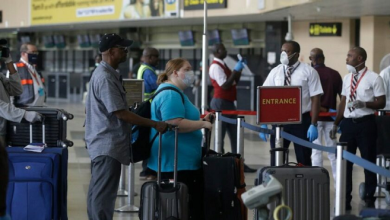Ireland Deports 35 Nigerians Including Children
Ireland’s sudden deportation of 35 Nigerians, including five children, has sparked alarm among rights groups and diaspora advocates.
The quiet overnight operation lacked prior notice or clear explanations, leaving families and observers in shock.
In a recent development that has stirred concern among observers and migrant communities, the Republic of Ireland has deported at least 35 Nigerian nationals, including five children, in a government-coordinated operation. The deportees, comprising 21 men, nine women, and five minors, were flown out of Dublin on a chartered flight that landed in Nigeria on Thursday morning.
Reports from Irish media, particularly the Irish Mirror, confirmed that the deportation took place late Wednesday night. Although there was an unplanned medical emergency that caused a temporary stopover en route, the flight eventually completed its journey, with all deportees returned to Nigeria without further incident.
Jim O’Callaghan, Ireland’s Minister for Justice, confirmed the deportation and expressed satisfaction that the operation was successfully carried out. “I’m happy to say that the individuals involved have now been returned to Nigeria,” he stated. However, no detailed explanation was given regarding the specific reasons for the mass removal of the Nigerians.
Instead, O’Callaghan offered a broad rationale, stating, “Ireland has a rules-based immigration system. It is important that those rules are robust and enforced.” This statement suggests that the deportees may have breached immigration regulations, but the lack of transparency has left many questions unanswered.
In Nigeria, the news came as a surprise to the Nigerians in Diaspora Commission (NiDCOM), the government body responsible for engaging with the Nigerian diaspora. A spokesperson for the commission revealed that they were not informed about the deportation and had received no prior notice from Irish authorities.
This incident highlights the growing tension around immigration enforcement across Europe, particularly in countries like Ireland that have witnessed an increase in asylum applications and undocumented migration in recent years. While governments often cite national security and the need for immigration control as justifications for such actions, critics argue that deportation exercises especially involving families with children require a more humane and transparent approach.
It remains unclear whether the deported Nigerians had exhausted all legal avenues to remain in Ireland or if some were still navigating asylum processes. Human rights organizations have previously raised alarms about the limited access to legal aid and due process for asylum seekers in various European states.
The inclusion of children among the deportees has also sparked concern, with child welfare advocates urging governments to adopt child-sensitive policies when dealing with immigration enforcement. “Returning children in such circumstances without adequate resettlement support in their country of origin could have lasting psychological and social consequences,” one rights group commented.
As Ireland continues to grapple with how to manage its immigration policy amid increasing global migration pressures, this deportation operation may not be the last of its kind. However, calls are growing louder for Dublin and other EU countries to align immigration enforcement with international human rights standards ensuring fairness, transparency, and dignity for all affected individuals.
Meanwhile, in Nigeria, questions linger over how these returnees will be reintegrated and whether government agencies will step in to provide the necessary support. With no clear action plan from authorities yet, their future remains uncertain.



